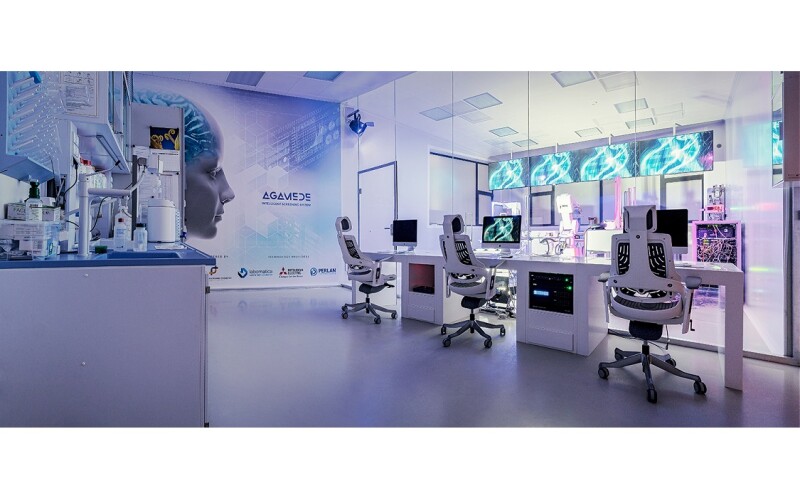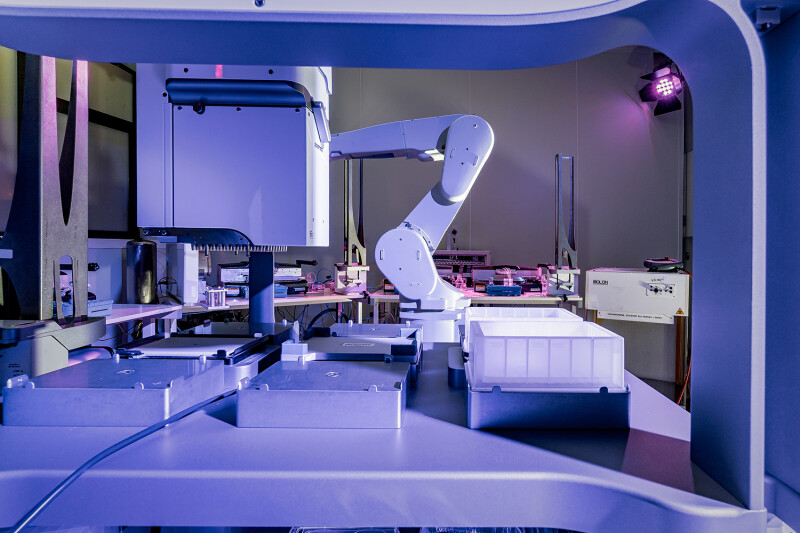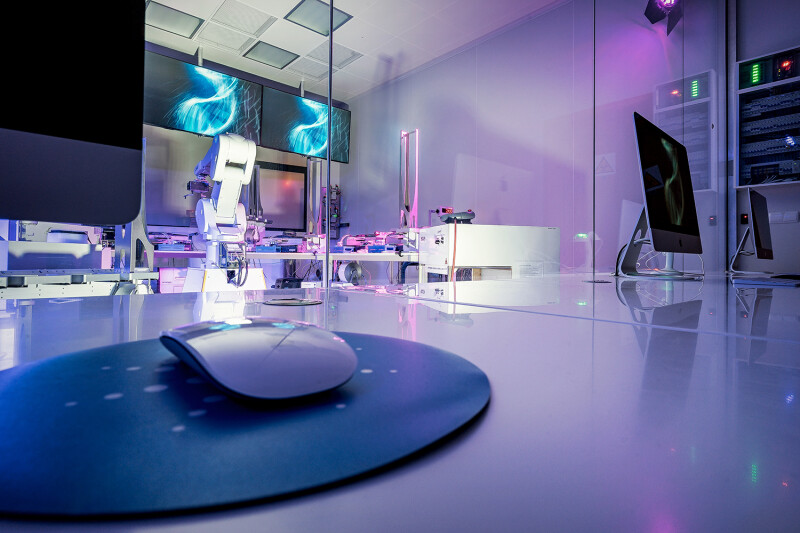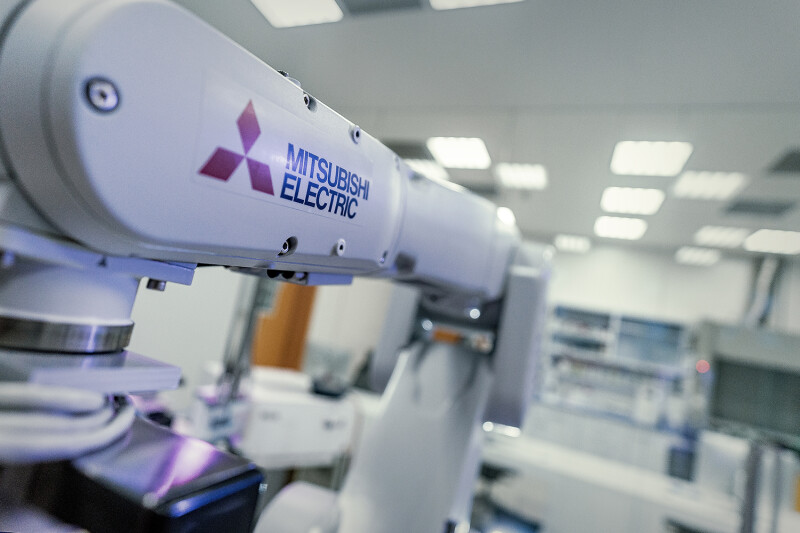Mitsubishi Electric Automation (United States) - Developed at the Institute of Bioorganic Chemistry of the Polish Academy of Sciences, alongside Mitsubishi Electric, Labomatica and Perlan Technologies, the AGAMEDE robotic system was designed to significantly speed up the diagnosis of SARS-CoV-2. Thanks to state-of-the-art automation technology combined with artificial intelligence, the system can test 15,000 individual samples per day. Other applications include researching new drugs, developing individualised cancer therapies or even creating cosmetic formulations.
Agamede is considered the first female scientist in history and therefore a fitting namesake for the laboratory automation system developed at the Institute of Bioorganic Chemistry of the Polish Academy of Sciences (IBCH PAS). While automating laboratory work is a common practice, the AGAMEDE robotic system combines automation and artificial intelligence (AI) to form a unique ‘closed loop’ setup. Here, the robots prepare experiments, read the results at a specified time and interpret the data using Labomatica’s Gene GameTM software to independently prepare the next experimental cycle. This means that operators simply need to define the question, design the experimental system and then monitor the correct sequence and operation of the system. AGAMEDE can then conduct experiments 24 hours a day and deliver results.
The combination of AI and automation in a high-throughput system is a breakthrough. Most automated high-throughput systems still require an operator to read the results and plan the next series of experiments after a cycle is completed. AGAMEDE can do this independently.
"Thanks to the AI module, AGAMEDE interprets the experiments without human involvement, based on mathematical models," explains Radosław Pilarski, PhD, the inventor and chief engineer of the system. "The system can be used by central diagnostic laboratories, pharmaceutical companies in drug development, oncology laboratories in search of personalised therapies for patients, but also in R&D departments of chemical and biotechnology companies to optimise bioprocesses."
EPICELL project:
Work on AGAMEDE began at the IBCH PAS in 2015. The system was originally developed for the EPICELL project, which was funded by the National Centre for Research and Development (NCBiR) as part of the STRATEGMED programme ’Prevention and Treatment of Civilisation Diseases‘. The aim of the project was to develop optimised media for the culture of induced pluripotent stem cell-derived (iPSC) cardiomyocytes.
The EPICELL consortium consists of the IBCH PAS, the Institute of Human Genetics PAS as well as three hospitals from Poznañ. Combining expertise in small molecule epigenetic modulators and experience in cell reprogramming, it conducted studies leading to the future development of methods for transforming induced iPSCs for the purposes of regenerative medicine. In particular, they looked at targeted implantation in the hearts of patients after heart attacks. The idea was to restore cardiac output to its pre-infarction state. The challenge was the number of experiments required to design a suitable mix of small molecule epigenetic modulators. For example, a recipe with ten components and ten different concentrations requires 10,000,000 experiments. "AGAMEDE was used to search for the right combination of compounds in a multidimensional system of solutions. From this, the composition of the reprogramming medium ’EPICELL One‘ was developed," explains Prof. Wojciech T. Markiewicz, head of the EPICELL project.
15,000 tests per day:
At the end of March 2020, the situation changed. Since its foundation, the IBCH PAS has been dealing with RNA and DNA nucleic acids, so it had all the facilities to deal with SARS-CoV-2 diagnostics. "Our institute was the first in Poland to develop a test to detect SARS-CoV-2. We soon decided to combine AGAMEDE's automation capabilities with our tests and developed a high-throughput diagnostic protocol that allows us to test 15,000 samples in one day. At least this is the potential, because IBCH PAS as a scientific entity does not have an accredited diagnostic laboratory. This is an outstanding result, because when analysing samples manually, one person can at most process a few hundred samples a day," says IBCH PAS director Prof. Marek Figlerowicz.
Robots, PLC and software from Mitsubishi Electric:
The AGAMEDE project was created alongside technology partners Mitsubishi Electric, Labomatica and Perlan Technologies. Mitsubishi Electric provided a 6-axis robot, PLC controls and its MELFA Basic software. The industrial robot with its long arm reach is the central component of the system. Using an integrated set of robotic tools, it can perform microscale experiments on 96- and 384-well microassay plates, reproducing the work of a laboratory technician who continuously operates the analytical equipment. It does this according to the experimental protocols entered by the operator into the control software.
The application further includes industrial cell culture incubators, plate and tip feeders, pipetting stations, labellers, barcode scanners, plate sealers, fluorescence readers and spectrophotometers. As a particular highlight, AGAMEDE is equipped with an automated confocal microscope HCA with four fluorescence channels. For the biotechnology community, this instrument is the equivalent of the Hubble telescope brought into the microcosm. Instead of astronomical objects, it photographs and analyses millions of cells and tissue structures with similar quality and efficiency. The device is complemented by an acoustic dispenser that releases quantities of liquid in the nanolitre range (millionths of a millilitre). Rapid dispensing of such small volumes of solution reduces research costs and increases throughput. It allows experiments to be conducted using a collection of over 115,000 chemical compounds available.
Working under high pressure:
"In implementing the first such advanced system in Poland – combining robotics with laboratory equipment – we benefited from our international experience. The support of Mitsubishi Electric's global organisation dedicated to innovative projects was very helpful," says Roman Janik, coordinator of solutions for the life science industry in Poland. However, he also emphasises the tight deadline of the project. "We all worked under time pressure to develop a solution that would relieve the lab technicians as quickly as possible. We were able to deliver a weekly throughput of 100,000 samples, which is scalable. This is a phenomenal result!"
Bringing many worlds together:
Tomasz Scholz, Robotics Engineer at Mitsubishi Electric further recalls: "The task would have been complicated even without the time pressure. The AGAMEDE project is an interdisciplinary project that combines the worlds of robotics, computer science, industrial design, mathematics, biology and chemistry. The solutions we used in it are innovative and unique. As with many projects, the biggest challenge was to define the goal and how we would achieve it. The key to this was to find a common ’technical language‘ so that people from different areas of expertise could communicate on the same level and make their expectations clear. It was often difficult to bridge the gap between the academic world, which thinks in abstract terms, and the industrial world, which typically follows a fixed pattern."
New approaches for laboratory planning:
The result is a system that not only works well, but also looks interesting. “Its design refers to ancient Greece and is a tribute to the beginnings of scientific thinking in our civilisation, especially to women in science,” explains Radosław Pilarski, PhD.
He further emphasises that the planning also paid attention to the laboratory space in which the installation was placed. A clean room for aseptic cell culture, windowless in most labs, was given a completely new look, breaking with previous standards. It is well lit thanks to large, carefully sealed windows. Glass panes were added to allow constant observation and control of the system without having to wear cleanroom suits. The work is facilitated by high-resolution 4K monitors and cameras that allow remote monitoring of AGAMEDE and experiments from anywhere in the world.
Picture 1 Caption:
The AGAMEDE project is an interdisciplinary project that combines the worlds of robotics, computer science, industrial design, mathematics, biology and chemistry.
Picture 2 Caption:
The robot from Mitsubishi Electric is the central component of the system. It continuously operates the analysers according to the specifications.
Picture 3 Caption:
Thanks to Labomatica's Gene Game software, which interprets the data, the system is a ’closed loop‘. It prepares and reads the data, interprets it and then independently adjusts the test series.
Picture 4 Caption:
Mitsubishi Electric's industrial robot offers a long arm reach as well as an integrated set of robot-controlled tools for micro-scale test series on 96- and 384-well microassay plates.
About Mitsubishi Electric Corporation:
With 100 years of experience in providing reliable, high-quality products, Mitsubishi Electric Corporation (TOKYO: 6503) is a recognized world leader in the manufacture, marketing and sales of electrical and electronic equipment used in information processing and communications, space development and satellite communications, consumer electronics, industrial technology, energy, transportation and building equipment. Mitsubishi Electric enriches society with technology in the spirit of its “Changes for the Better.” The company recorded a revenue of 4.194,4 billion yen (U.S.$ 37,8 billion*) in the fiscal year ended March 31, 2021.
*U.S. dollar amounts are translated from yen at the rate of ¥111=U.S.$1, the approximate rate on the Tokyo Foreign Exchange Market on March 31, 2021.
About Mitsubishi Electric Factory Automation Business Group:
Offering a vast range of automation and processing technologies, including controllers, drive products, power distribution and control products, electrical discharge machines, laser processing machines, computerized numerical controllers, and industrial robots, Mitsubishi Electric helps bring higher productivity – and quality – to the factory floor. In addition, our extensive service networks around the globe provide direct communication and comprehensive support to customers.
About Factory Automation EMEA:
Mitsubishi Electric Europe B.V., Factory Automation EMEA has its European headquarters in Ratingen near Dusseldorf, Germany. It is a part of Mitsubishi Electric Europe B.V. that has been represented in Germany since 1978, a wholly owned subsidiary of Mitsubishi Electric Corporation, Japan.
The role of Factory Automation EMEA is to manage sales, service and support across its network of local branches and distributors throughout the EMEA region.
About e-F@ctory:
e-F@ctory is Mitsubishi Electric’s integrated concept to build reliable and flexible manufacturing systems that enable users to achieve many of their high speed, information driven manufacturing aspirations. Through its partner solution activity, the e-F@ctory Alliance, and its work with open network associations such as The CC-Link Partners Association (CLPA), users can build comprehensive solutions based on a wide ranging “best in class” principle.
In summary, e-F@ctory and the e-F@ctory Alliance enable customers to achieve integrated manufacturing but still retain the ability to choose the most optimal suppliers and solutions.
*e-F@ctory, iQ Platform are trademarks of Mitsubishi Electric Corporation in Japan and other countries.
*Other names and brands may be claimed as the property of others.
*All other trademarks are acknowledged.















































Interested? Submit your enquiry using the form below:
Only available for registered users. Sign In to your account or register here.